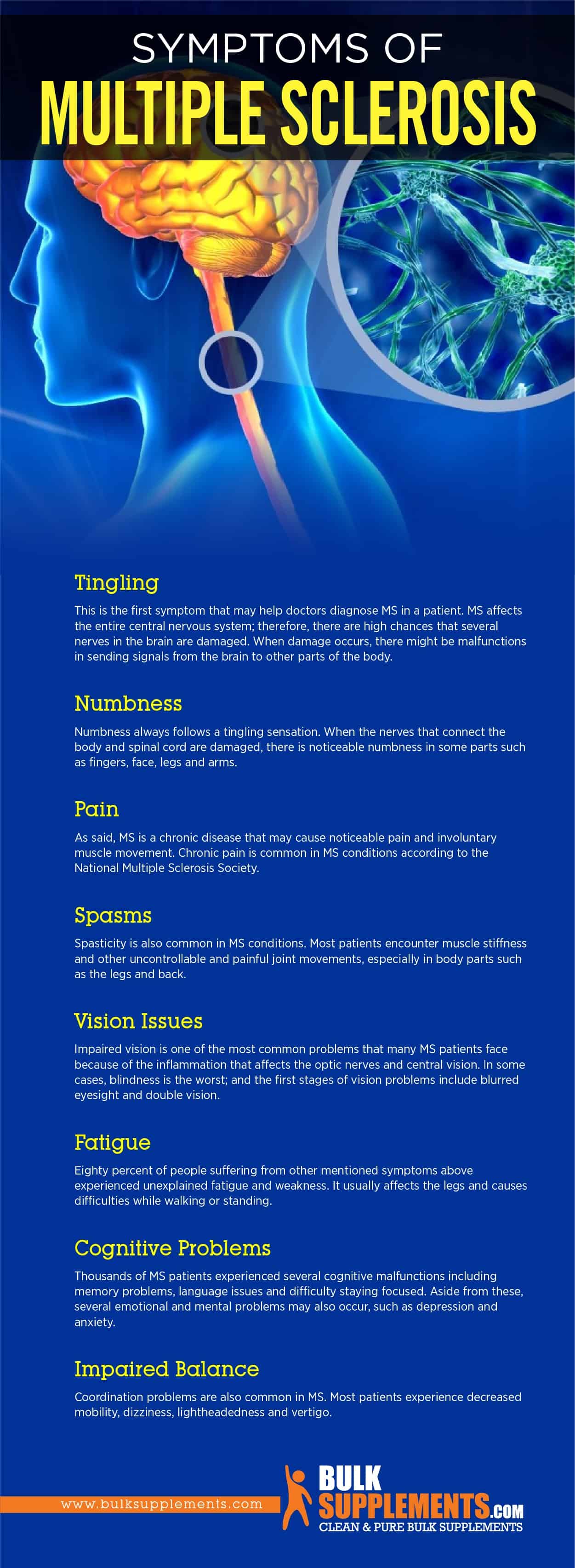Multiple Sclerosis (MS): Symptoms, Causes & Treatment
by James Denlinger Digital Marketing StrategistWhat is Multiple Sclerosis?
Multiple sclerosis, or MS, is a chronic condition that affects the central nervous system, which includes the optic nerves, brain and spinal cord. It can lead to an array of unmanageable symptoms all over the body. Over a million people worldwide suffer from multiple sclerosis.
Some people experience mild symptoms such as tingling, numbness and blurred vision, while others encounter paralysis and impaired mobility. Regardless of its severity, it is important to know how one develops this condition to prevent and treat it properly.
Types of Multiple Sclerosis
There are four major types of multiple sclerosis. In 2013, the International Advisory Committee on Clinical Trials of Multiple Sclerosis identified these types as:
- Clinically isolated syndrome
- Primary progressive
- Relapsing-remitting
- Secondary progressive
These four vary as far as symptoms and treatments. Here is a detailed discussion for these MS courses:
Clinically Isolated Syndrome (CIS)
CIS is considered the first neurological symptom because of the inflamed central nervous system. This episode usually lasts at least 24 hours and may or may not continue to develop as multiple sclerosis. There are circumstances of a person who encountered CIS, yet the condition did not continue to develop MS. However, if there is a lesion along with CIS that affects the brain, the patient is at higher risk to continue the progression to the second neurological symptom.
Relapsing-Remitting Multiple Sclerosis (RRMS)
As the second stage of developing MS, RRMS is the most common diagnosed course in millions of people. It is characterized by mild to severe attacks of neurological symptoms. Partial or complete remissions may occur after the relapses. During this phase, all the previous symptoms may vanish while others may continue or worsen, becoming permanent. However, there is no certain progression of this condition, especially during the remission period.
RRMS can be characterized as active, not active, worsening or not worsening, depending on the initial diagnosis and the symptoms.
Secondary Progressive Multiple Sclerosis (SPMS)
After the diagnosis of RRMS, most people who encountered continuous progression of symptoms eventually fall into SPMS. It is then usually followed by an initial RRMS course and considered a progressive worsening stage. SPMS can be identified in a few different points: (1) active, (2) not active, (3) with progression, and (4) without progression.
Primary Progressive Multiple Sclerosis (PPMS)
Of all the stages, PPMS is considered the worst neurologic course. It is a phase of disability with no relapses or remissions. PPMS can be identified to different points such as active, not active, with progression and without progression.
Symptoms of Multiple Sclerosis
Although MS is difficult to characterize due to its courses, there are various symptoms that can help both patients and doctors know the course of MS. These symptoms include, but are not limited to:
- Tingling
- Numbness
- Pain
- Spasm
- Vision issues
- Fatigue
- Cognitive problems
- Impaired balance
Tingling
This is the first symptom that may help doctors diagnose MS in a patient. MS affects the entire central nervous system; therefore, there are high chances that several nerves in the brain are damaged. When damage occurs, there might be malfunctions in sending signals from the brain to other parts of the body.
Numbness
Numbness always follows a tingling sensation. When the nerves that connect the body and spinal cord are damaged, there is noticeable numbness in some parts such as fingers, face, legs and arms.
Pain
As said, MS is a chronic disease that may cause noticeable pain and involuntary muscle movement. Chronic pain is common in MS conditions according to the National Multiple Sclerosis Society.
Spasms
Spasticity is also common in MS conditions. Most patients encounter muscle stiffness and other uncontrollable and painful joint movements, especially in body parts such as the legs and back.
Vision Issues
Impaired vision is one of the most common problems that many MS patients face because of the inflammation that affects the optic nerves and central vision. In some cases, blindness is the worst; and the first stages of vision problems include blurred eyesight and double vision.
Fatigue
Eighty percent of people suffering from other mentioned symptoms above experienced unexplained fatigue and weakness. It usually affects the legs and causes difficulties while walking or standing.
Cognitive Problems
Thousands of MS patients experienced several cognitive malfunctions including memory problems, language issues and difficulty staying focused. Aside from these, several emotional and mental problems may also occur, such as depression and anxiety.
Impaired Balance
Coordination problems are also common in MS. Most patients experience decreased mobility, dizziness, lightheadedness and vertigo.
 PIN IT
PIN ITCauses of Multiple Sclerosis
The causes of multiple sclerosis are still unclear. However, many scientists believe that MS is an autoimmune condition. In short, MS affects the healthy tissues inside the body, similar to how other autoimmune diseases work. To help patients and doctors, researchers examined different risk factors for MS.
These factors include:
- Environment
- Genes
- Immune system
- Infection
- Lifestyle
Environment
Experts have found that people living in countries near the equator have an increased pattern of multiple sclerosis. They are more exposed to sunlight, which may not be good for the body. Since multiple sclerosis is likely an immune-mediated condition, sunlight exposure and too much production of vitamin D are possible factors.
Genes
Genes are the top factor that many experts consider. In a study from the National Multiple Sclerosis Society, there is a higher risk for people who have parents and siblings diagnosed with MS. If anyone has the genetic condition, the chances of developing MS range from 2.5 to 5 percent. Some multiple sclerosis patients are possibly born with genetic susceptibility that reacts to unknown environmental factors. It can impact one’s autoimmune response when he or she encounters such an agent.
Immune System
One’s immune system protects the body, but it can also influence the development of a condition like multiple sclerosis. Many experts consider MS as an immune-mediated condition, which means the central nervous system may attack rather than protect. There remain no concrete findings to signify what may trigger the immune system to attack the myelin or the nerve cells’ protective sheath. However, scientists are still studying all sides to uncover the answers.
Infection
Bacterial and viral infections can trigger the development of multiple sclerosis. For instance, viruses can cause inflammation, which may lead to myelin breakdown. Myelin protects the nerve fibers, and if they are damaged, the nerve becomes unprotected, which may cause MS.
Lifestyle
Aside from these four major causes, there are also minor ones which encompass gender, age and ethnicity. In age, experts found that the relapsing-remitting multiple sclerosis or RRMS affects people ages 20 to 50. PPMS or primary-progressive multiple sclerosis may occur 10 years later than other types. Gender may also play a role in developing MS. Women are three times at risk to develop RRMS compared to men. However, with PPMS, the number of men and women is equal. Regarding ethnicity, people living in regions and countries near the equator exude a higher risk of developing multiple sclerosis.
Multiple Sclerosis Treatment
Multiple sclerosis has no exact cure, but there are treatment methods to help you slow down the progression. Today, there are many ways to help a patient overcome the pain and other symptoms of MS. These treatments include medications, therapies, lifestyle changes and supplements.
Medications
Most doctors recommend taking muscle relaxants, pain relievers and more. These medications may vary depending on the purpose of the intake. For instance, if the patient experiences excessive fatigue, the doctor may recommend amantadine and methylphenidate. These two examples are best in managing fatigue.
Therapies
In some MS cases, physical or occupational therapy is the best way to find relief. Therapists may teach patients basic stretching and other exercises to strengthen their bodies. Although the method may not completely help the patient recover, it can assist them in performing some daily tasks.
Supplements for Multiple Sclerosis
There are several supplements that can be useful in maintaining the health of the brain and nervous system. These include glycine powder, L-serine powder, pure taurine and biotin. Most of these supplements are helpful in helping patients overcome some cognitive malfunctions and spasms.
Glycine Powder
Glycine is a supplement that helps serve as a building block for protein. You can get glycine through eating protein-rich products such as legumes and fish.
L-Serine Powder
Take no more than 2,000 mg of L-serine powder per day. It will help patients in easing nerve pain, one of the main MS symptoms.
Pure Taurine
Similar to glycine, pure taurine is an amino acid. In some research, there are different dosing systems for taking this supplement. Take 500 mg twice per day. Meat and fish are also two good sources of taurine.
Biotin
Biotin falls under vitamins. It helps patients to overcome several MS symptoms such as nerve damage. The best sources of biotin are bananas, eggs and milk.
Vitamins
An array of vitamins can help MS patients maintain and support their health. This includes vitamin D, B6, B12 and antioxidant vitamins. Vitamin D is best to help the patient recover from immune malfunction. People can get vitamin D through fish, dairy products and cereals.
Lifestyle Changes
Almost half of the MS patient population is said to be a smoker or a drinker. For doctors, one of the best and most natural ways to treat symptoms of MS is through changing the patient’s lifestyle. It includes proper diet and hygiene, exercise and quitting smoking and alcoholic beverages. Accordingly, the patient may recover faster with no need for surgical operations or such.
The Bottom Line
Multiple sclerosis is not a simple disease. It affects how a person thinks, acts and feels. All aspects of an individual are impacted, which may lead to complications such as depression, avoidance and self-pity. Therefore, aside from treatments, support from the family is most critical.
As a key takeaway, MS is a condition that needs full attention from the experts and the family. If you have observed some mentioned symptoms above, then contact your doctor immediately.
Sponsor Ads
Created on Mar 11th 2020 11:10. Viewed 373 times.




